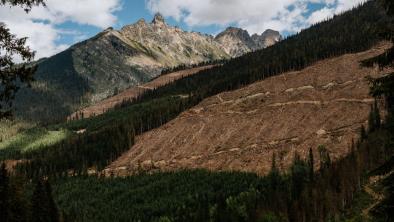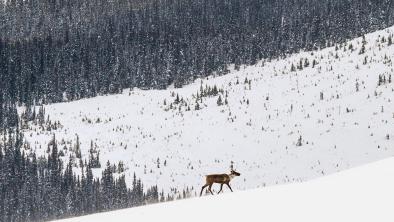Wilderness Committee picks 12 favourite environment good-news stories for 2008
Wilderness Committee media

News Release – Christmas Eve
Vancouver, British Columbia (BC), Canada – In the spirit of the season, the Wilderness Committee today released a list of the organizations 12 favourite environment good-news stories for 2008.
"Its time once again to consider and celebrate the years good fortune," said Wilderness Committee National Campaign Director, Joe Foy. "What a year its been – with First Nations, citizen activists, environment groups, community leaders and governments of all stripes pitching in to deliver hope for the planet. Here are a dozen of the finest gifts we found under the tree in 2008," said Foy.
Elaho Valley. With the passage of Bill 38 into law in June of 2008 the BC government protected a ton of wilderness areas. One of them, the 10,000 hectare Upper Elaho Valley located west of Whistler BC had been the scene of an intense logging vs. preservation battle throughout the latter half of the 1990s, and had been previously declared a Wild Spirit Place by the Squamish Nation.
Great Bear Rainforest. Bill 38 also protected in law 46 new conservancy areas in the Great Bear Rainforest, located on BCs Pacific Coast and another well-known conservation hot spot from the 1990s. Together with 65 conservancies established in previous years, the total amount of protected areas in the Central and North Coast of BC now sits at 1.8 million hectares.
Duu Guusd. Bill 38 also conferred conservancy status on the 139,789 hectare Duu Guusd, protected area located on the northwest section of the island of Haida Gwaii. For over three decades the Haida Nation have advocated protection of this amazing area of mountains and valleys cloaked in ancient temperate rainforest and rimmed by a wave tossed coast line.
Manitobas provincial parks. This year the government of Manitoba announced that it would end logging throughout their provincial park system. One park, Duck Mountain, remains open to logging but conservationists are hopeful that a future win can be had here too.
Carbon Tax. British Columbia becomes the first jurisdiction in North America to enact a consumer-based carbon tax, an effective tool in the fight to lessen the use of fossil fuels and fight the root cause of climate change.
Upper Pitt River and Pinecone Burke Provincial Park. BCs environment minister announced early this year that he would not allow a power line to be constructed through Pinecone Burke Provincial Park, thereby ending chances of a private company building a series of hydro power plants in the salmon-rich Pitt River system just north of Maple Ridge, BC.
Salmon Farm moratorium. A moratorium on salmon farming along BCs North Coast was put in place because of concerns over impacts on wild salmon stocks. Farms are banned north of the coastal village of Klemtu.
Sacred Headwaters moratorium. A two-year moratorium was declared on development of coal-bed methane in the Klappan coal field, located in an area of northern British Columbia known as the Sacred Headwaters region because it contains the headwaters of BCs great salmon rivers: the Skeena, Nass and Stikine.
Dodds-Roundhill Coal Mine and Gasification Plant put on hold. Sherritt International put on hold this year its plan to build a $3.3 billion coal gasification project near Edmonton, Alberta. The plant would have been Canadas first coal gasification plant and a major greenhouse gas emitter.
Cathedral Grove. Faced by increasing public protests, the logging company Island Timberlands shelved plans to log in world famous Cathedral Grove next to the boundary of Vancouver Islands MacMillan Provincial Park.
Hesquiat Point Creek Valley. Mamook/Coulson logging company backed away from plans to log in Hesquiat Point Creek Valley, an intact area of ancient rainforest within Clayoquot Sound.
Blackwater Creek Mushroom Forest. Lizzie Bay logging company dropped plans to log in the Blackwater Creek Valley, located north of Whistler, BC. The valley is an important pine mushroom harvest area for Statimc First Nation people. Numerous protests and campouts had been held in support of protecting the area, which is also important spotted owl and grizzly bear habitat.
"Heres to a joyful 2009 ahead, full of lots of gifts for wild nature," said Foy.
For more information contact Joe Foy (604) 880-2580.


